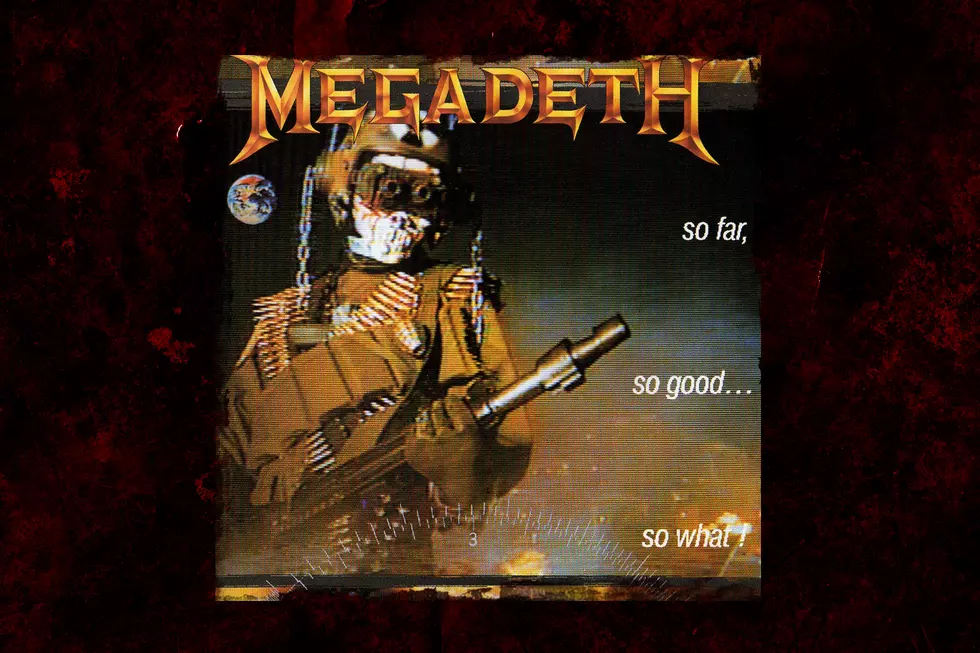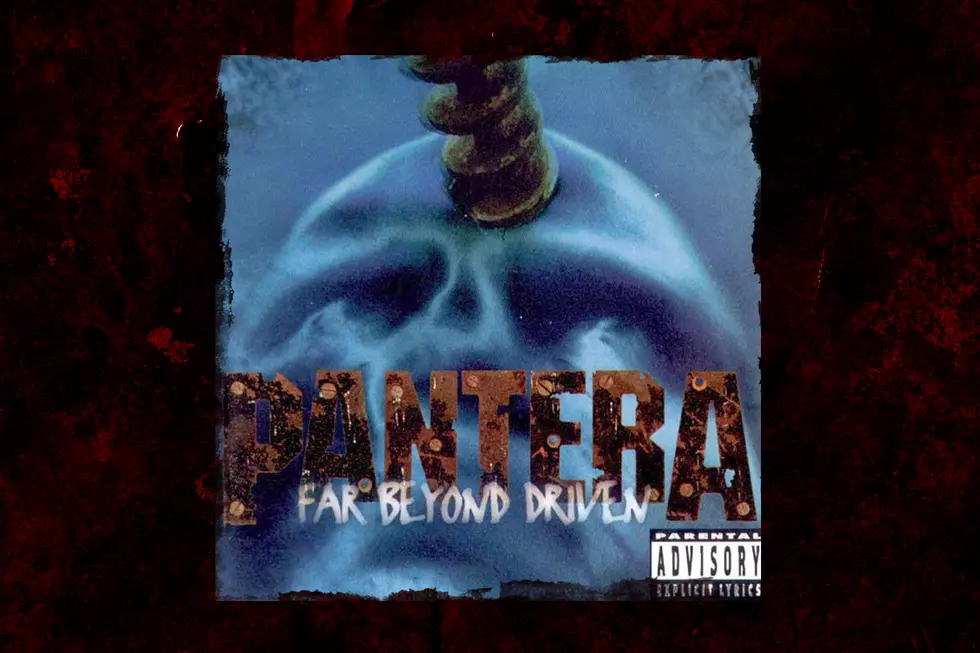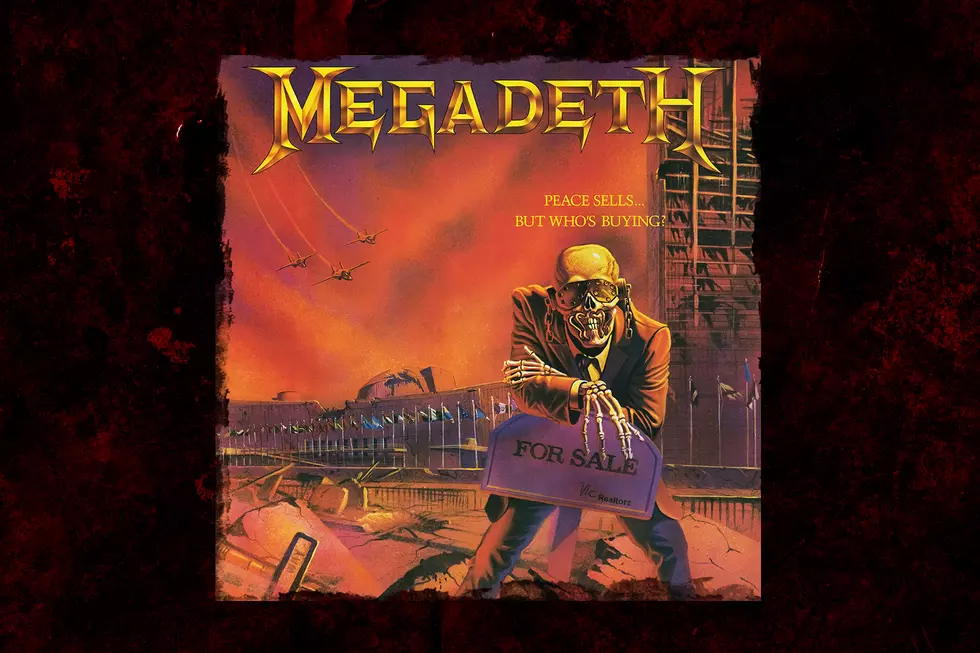
36 Years Ago: Megadeth Release ‘So Far, So Good… So What!’
When Megadeth frontman Dave Mustaine fired drummer Gar Samuelson and guitarist Chris Poland for failing to show up for soundchecks and exhibiting other irresponsible and substance-impaired behavior, the band had to find replacements fast. They were scheduled to start working on their third album, So Far, So Good… So What!, as soon as they finished touring and needed to act quickly. Samuelson was easily replaced with capable drum tech Jeff Behler, but locking in someone for the guitar slot was more of a challenge.
The band initially hired ex-Malice guitarist Jay Reynolds to play on the record, which was released on Jan. 19, 1988. But when Megadeth entered Music Grinder studio to work on the album, they realized Reynolds was out of his league. After Mustaine laid down the rhythms for one of the songs he told Reynolds to play his part and the guitarist asked Mustaine if he could invite his guitar teacher, Jeff Young, to the studio to help him out with the solos.
“It was like he’d been trying to hide for weeks the fact that he was in over his head and now he’d come up with a solution. Only it wasn’t a solution at all,” Mustaine wrote in his memoir, Mustaine.
Young, did, indeed, show up at the studio, but it was to audition for the second guitar slot, which Reynolds was relieved of before recording a note for the album. Considering the abrupt changes that took place before it was written, So Far, So Good… So What! is a surprisingly strong and consistent album -- maybe not quite up to the standards of Peace Sells… But Who’s Buying?, but impressively bleak, heavy and virtuosic.
For the instrumental album opener “Into the Lungs of Hell,” Mustaine integrated horn, flute and percussion samples within the framework of tumbling double-bass drums, crushing rhythms and flailing lead guitars. The second track, “Set the World Afire” was the first song Mustaine wrote after being fired from Metallica. Not only did he pen the lyrics on the back of a political pamphlet from California Senator Alan Cranston, he was inspired to name the band Megadeth after reading a term in Cranston’s pamphlet.
Megadeth, "Set the World Afire" - Live (1988)
“It said, ‘The arsenal of Megadeath can’t be rid,’ Mustaine told Louder Than Hell: The Definitive Oral History of Metal. “ I thought, ‘What a fantastic song title.’ That song later became ‘Set the World Afire.’ So, in the midst of having a problem naming the band, it was suggested that we call ourselves Megadeth instead of the song. With extreme lack of foresight, I decided to go with that, not knowing what a professional setback the name would be for us. No one imagined this band would become this successful at the level where the name would affect us. When you’re thinking about ruling the club circuit and playing the arenas, and unsafe sex and drugs and alcohol and parties and fighting and speeding down the roads, the thought of someone not liking your band because the name’s “Megadeth’—it’s like, ‘Fuck you, it’s your loss.’ But when you’re trying to get on the radio that’s something else entirely.”
With several strong songs written, including the barreling “Hook in Mouth” and the doomy thrash of “In My Darkest Hour” -- which Mustaine penned about the death of Metallica bassist Cliff Burton -- Megadeth’s frontman decided to record a cover song, as he had on the band’s first two albums. He planned to go with Sex Pistols “Problems,” but was convinced by his label to record “Anarchy in the UK” since it was more instantly recognizable.
Megadeth, "Anarchy in the UK" (Sex Pistols cover)
“The coolest thing about the entire thing was getting [Sex Pistols guitarist] Steve Jones to play guitar on the track,” Mustaine wrote in his memoir. “We didn’t know how he would respond to the invitation, but he was quick to accept. He was living in Southern California at the time, and he just rode in one day on his Triumph motorcycle and strolled in with a smile on his face… and a cast on his arm. Jonesy wasn’t about to let a little thing like a broken arm prevent him from playing.”
READ MORE: The Most Played Song Live Off Every Megadeth Album
Megadeth recorded So Far, So Good… So What! with producer Paul Lani in mid-1987, and the process was relatively pain-free. But when it was time to mix and master the album Lani thought a change of scenery was a good idea, so he convinced Mustaine to finish the record with him at Bearsville Studio near Woodstock, N.Y. While Lani had previously remixed Peace Sells... But Who’s Buying?, it soon became clear that the relationship wasn’t going to work out.
“Everything about the guy just rubbed me the wrong way,” Mustaine wrote. “From his insistence on offering lessons in etiquette at mealtime to his maddeningly persnickety approach to the mixing process.”
Megadeth in Decline of the Western Civilization Part II: The Metal Years
The breaking point with Lani came one morning when Mustaine was making himself a pot of coffee after waking up, and he looked out the window to see Lani in his underwear feeding a peeled apple to a deer. Mustaine fired Lani on the spot and was on a plane back to Los Angeles a few hours later. He immediately replaced Lani with German engineer Michael Wagener, who had previously worked with Metallica, among other major bands. Despite Wagener’s credentials, Mustaine was ultimately unhappy with how he mixed the album. “He turned in a pedestrian effort, burying everything under reverb and generally giving the record a muddy feel,” Mustaine wrote.
While So Far, So Good… So What! was created during a turbulent time for Megadeth, and was the only album Behler and Young played on, it sold more rapidly than any of the band’s records to date, shifting 400,000 copies during its first month in stores. The record spawned three singles, “Anarchy in the U.K.,” “Mary Jane” and “Liar” and was certified platinum on May 26, 1998.
Young and Behler were fired from Megadeth in August 1998, immediately after the band finished touring. They were replaced by guitarist Marty Friedman and drummer Nick Menza.
Mustaine and Ralph Patlan remixed So Far, So Good… So What! in 2004 and hired Tom Baker to remaster the record. The release also featured four mixes by Lani, assumedly created while he was wearing pants and a shirt.
Loudwire contributor Jon Wiederhorn is the author of Raising Hell: Backstage Tales From the Lives of Metal Legends, co-author of Louder Than Hell: The Definitive Oral History of Metal, as well as the co-author of Scott Ian’s autobiography, I’m the Man: The Story of That Guy From Anthrax, and Al Jourgensen’s autobiography, Ministry: The Lost Gospels According to Al Jourgensen and the Agnostic Front book My Riot! Grit, Guts and Glory.
Top 75 Hard Rock + Metal Guitarists of All Time
Gallery Credit: Loudwire Staff
More From Classic Rock 105.1










